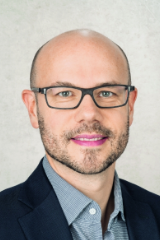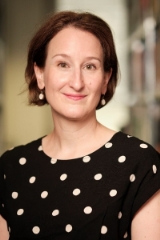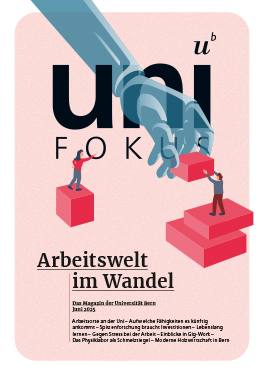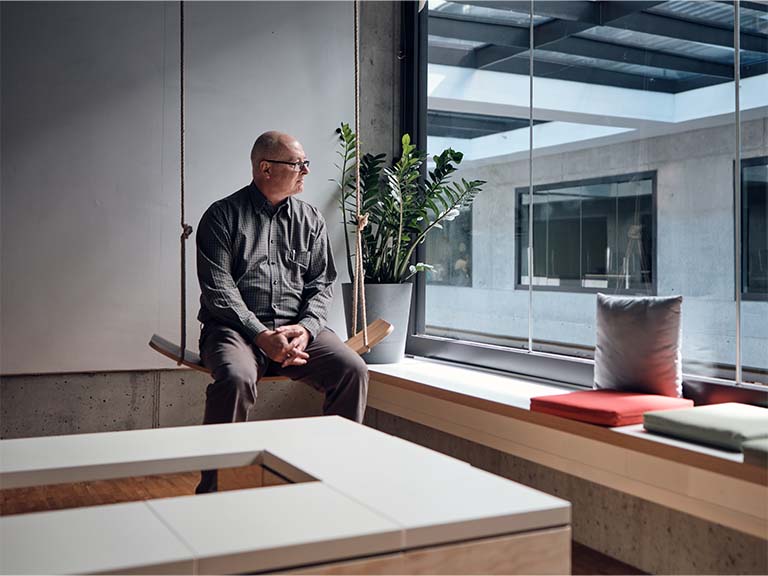Lifelong Learning Center
Learning is good for you – throughout your life
New technologies and demographic trends are changing the world of work and thus also continuing education: Continuous learning enables access to new professions and skills. The University of Bern sees itself as a place of learning throughout all phases of life.

Andreas Hirschi is convinced that digitalization and automation are two major trends that are currently transforming the world of work. “Most people’s work content will change, and some professions will disappear altogether,” says the Professor of Occupational and Organizational Psychology at the University of Bern. Demographic trends are also making themselves felt: “There are more older people working and they are increasingly working beyond the normal retirement age.”
Career mosaics are replacing linear careers
The consequences of this development: Professional careers are more dynamic, employees change jobs or even industry more often, have a second job in addition to their main job or become self-employed. “The linear career path will become rarer. Instead, people will be having a career mosaic that they put together individually,” says Hirschi.
ABOUT THE PERSON

Andreas Hirschi
is Full Professor of Occupational and Organizational Psychology at the University of Bern. His research focuses on career choice, career development and career guidance. Among other things, his teaching activities include application-oriented seminars on career development.
University education for children, the working population and the elderly
Continuing education opportunities are also changing as the world of work develops. Against this backdrop, the University of Bern’s Center for University Continuing Education (ZUW) is becoming a Lifelong Learning Center (LLC) (see box). “Knowledge is developing rapidly – and universities are called upon to play an active role in shaping this change,” explains LLC Director Christina Cuonz. “We do not see lifelong learning – i.e. educational opportunities for people at different stages of life, from children and working people to older people – as an isolated additional service, but as an integral part of our educational mission.”
“We do not see lifelong learning as an isolated additional service, but as an integral part of our educational mission.”
Christina Cuonz
Continuing education becomes an integral part of the world of work
Continuing education must also be consistently geared to the needs of the job market: “For the younger generation, learning and development opportunities are a natural part of an attractive working environment, and they actively incorporate this aspiration into employment negotiations.” Beyond the actual studies, the university should also be a place that gives people in different life situations and age groups access to academic knowledge. Overall, the aim of continuing education alongside work is not only to impart knowledge, but also to enable people to shape their own careers independently, explains Cuonz. “Methodological and social skills are increasingly required in order to be able to react flexibly to change,” she says.
About the person

Christina Cuonz
is Director of the Lifelong Learning Center (LLC) at the University of Bern. She studied English and German language and literature and journalism at the Universities of Lausanne, Oslo and Edinburgh and holds a doctorate in cognitive sociolinguistics. Christina Cuonz is involved as a lecturer in continuing education courses in the areas of continuing education management and leadership communication.
Learning promotes cognitive health
Occupational psychologist Andreas Hirschi also emphasizes the importance of overarching skills such as personal initiative, the ability to adapt to new working conditions and teams, and personal responsibility: “To remain interesting in this dynamic job market and to be able to find a new position at any time, you have to take the initiative when it comes to change.” In other words, you shouldn’t start training in times of need, such as after you’ve lost your job, but think again and again about what skills you need to survive in the changing job market.
Magazine uniFOKUS

The changing world of work
This article first appeared in uniFOKUS, the University of Bern print magazine. Four times a year, uniFOKUS focuses on one specialist area from different points of view. Current focus topic: The changing world of work.
Continuing education alongside work thus serves to help individuals maintain their position in a dynamic job market. But why should older people who are about to retire or who are already retired also want to continue education? “Studies actually show that older people are less motivated to take part in continuing education programs,” says Hirschi. On the one hand, this is due to the fact that employers tend to invest in young employees. On the other, older people often consider themselves less capable of learning – wrongly, as research shows. “The ability to learn is retained into old age. What’s more, a 60-year-old may well be in a company just as long as a 25-year-old who changes jobs after a few years because she’s bored.” Continuous learning also contributes to cognitive health: Just as regular exercise keeps the body fit, learning also keeps the brain young. “Lifelong learning means seeing learning as an opportunity rather than a burden,” explains Hirschi. “Learning new things is rewarding and should be fun.”
Financial benefits of continuing education are not guaranteed
Of course, joy alone is not enough. Those who are in professional life will primarily undergo further education and training in order to protect themselves against unemployment and to have a better chance when negotiating a salary. Does expensive training pay off in terms of salary? Not necessarily, says Stefan Wolter, Director of the Centre for Research in Economics of Education at the University of Bern. While it has been proven that a university degree has a positive impact on a salary, it is difficult for researchers to establish a causal link between a completed course of continuing education and higher pay.
“The ability to learn is retained into old age.”
Andreas Hirschi
Too many factors play a role here: Was an employee not promoted simply because he had decided not to pursue further training a few years earlier? Does his colleague earn more today because she attended the course, or has she always shown more motivation and commitment? But it is true that when a company initiates and pays for the training, this often has an impact on the salary. But it goes without saying that a prior selection takes place here too: Companies are more likely to grant training to capable and motivated employees, and they tend to send them to courses that have a direct impact on work productivity.
Knowledge is becoming obsolete faster than ever
The fact that continuing education is important for a career is not in itself a new phenomenon, says Wolter: “We’ve been talking about this for over 50 years.” What has changed, however, is the reason why someone continues their education: In the 1960s, continuing education primarily served to compensate for shortcomings in the formal education system and make up for missed opportunities. Today, things are different: “More than twice as many people are entering the job market with a university degree than they were 25 years ago.” They bring with them an enormous level of knowledge. At the same time, digitalization is causing this knowledge to quickly become outdated and lose value. “Anyone who does not counteract this with continuous further education runs the risk of being disqualified,” says Wolter. “It’s a race against time.”
“It’s a race against time.”
Stefan Wolter
In addition, new technologies mean that existing professions are disappearing and new fields of activity are opening up. That is not a new phenomenon either, says Wolter. “But change is happening faster, and the needto completelyreorient yourself during your career is becoming increasingly likely.”
About the person

Stefan Wolter
is Head of the Economics of Education Research Unit at the University of Bern. He studied economics and psychology at the University of Bern and is titular professor of economics of education at the University of Bern.
Trend towards on-the-job training
The advantage of continuing education: It can react more quickly to societal changes than the formal education system. At the turn of the millennium, continuing education programs such as CAS and MAS became established, which imitated a university degree by awarding ECTS credits, but often did not bring a direct transfer of knowledge into day-to-day work. Wolter: “Today, continuing education has to be practical and pay off immediately, both for companies and employees.”
Subscribe to the uniAKTUELL newsletter

Discover stories about the research at the University of Bern and the people behind it.
It makes no sense to acquire skills in continuing education without knowing whether you are ever going to need them. LLC Director Cuonz is also convinced that targeted, practical on-the-job training, for example with micro-certificates, is becoming increasingly important: “Work and training no longer take place in separate phases, but are increasingly merging into eachother.” In other words: Continuing education is increasingly becoming part of professional activity.
Lifelong learning
Everything under one roof
The Center for University Continuing Education at the University of Bern (ZUW) is currently being transformed into a Lifelong Learning Center (LLC). The LLC sees itself as a competence center for lifelong learning and brings together all offerings outside of undergraduate studies under one roof – from the Children’s University and in-service continuing education to the Senior Citizens’ University. The University of Bern already offers over 140 courses in all faculties. In addition to the CAS, DAS and MAS formats, there are more and more micro-certificates for targeted continuing education. Digital and hybrid formats are being expanded and cooperation with partners from business, universities and government is being stepped up. Topics such as digitalization, artificial intelligence and sustainability are taught on an interdisciplinary basis.


